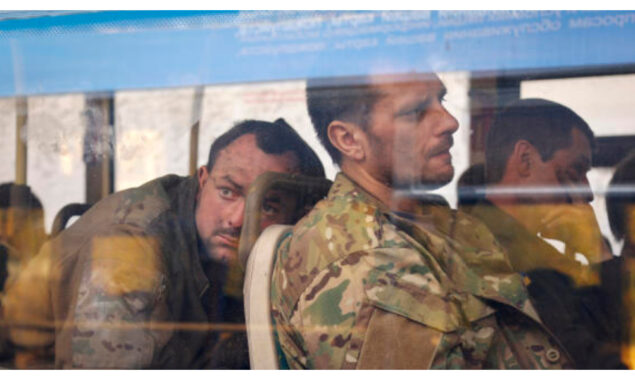64 Ukrainian troops’ bodies were repatriated from the Azovstal steel facility
Hundreds of Ukrainian combatants and civilians were trapped in a Mariupol steel...

Hell of families of captured Ukraine Azovstal ‘heroes’
For weeks, the world watched as Mariupol’s last defenders resisted Russian bombardment beneath the city’s massive Azovstal steel plant.
The epic battle came to represent Ukrainian resistance to Russian invasion.
However, more than a month after hundreds of Azovstal fighters surrendered to Russian troops who took over the besieged port, their families and loved ones are still unsure whether they are dead or alive.
Among them is Kateryna Prokopenko, the wife of Denys Prokopenko, the commander of Ukraine’s Azov Regiment — a battalion that led the units holed up in the Azovstal plant.
It was Prokopenko — a large bandage on his right arm — who announced on May 20 that Ukraine’s high command had ordered them to surrender to save his soldiers’ lives.
Kateryna told AFP that during their last conversation, her husband promised they “would see each other soon”.
“Last time I spoke to my husband, I told him he was like a Marvel hero but a real one,” the 27-year-old said.
Sergiy Volynsky, another officer from Azovstal, sent his family “a last text message” before surrendering, saying he would no longer be in touch, his sister Tatyana Kharko said.
Since then, they’ve had “not a word” from him.
“Absolutely nothing. I don’t know where he is, if he has been feed, if he has been tortured,” Kharko, 32, told AFP.
“There are reports in the Russian media that some guys were transferred to Moscow, others to elsewhere in Russia,” she added.
Prokopenko said she has been “exhausted” by the wait for news of her husband.
“I haven’t talked to him in a month. I’m just waiting for him to call. It has made me so nervous,” she said.
While Kyiv said Wednesday that 95 of the “defenders of Azovstal” — all “badly wounded”, according to Prokopenko — have been exchanged for Russian prisoners, nothing has filtered through about the others.
Andriy Yermak, an aide to Ukraine’s President Volodymyr Zelensky, said in a recent interview that Kyiv “can’t say in what conditions” the soldiers are held.
But “we know they are still alive,” he added.
According to Moscow, 2,439 Ukrainian soldiers were taken prisoner from the Azovstal steelworks, where they hunkered underground in a network of Soviet-era tunnels.
Pummelled by Russian forces and surviving with meagre supplies of food and ammunition, they continued fighting for weeks, with videos shot in the tunnels winning them and the Ukrainian cause sympathy and respect.
“My brother spoke to the Pope and told him that he must have seen many things in his life, but ‘I am sure you have never saw anything like what is happening in Mariupol now, because this is what hell is like,'” Kharko said.
The lionising of the defenders has annoyed Moscow, which brands the members of the Azov Regiment, a former far-right paramilitary unit that has integrated into Ukraine’s army, as “nationalist Nazis”, a tag that their relatives strongly refute.
An official of pro-Russian separatists in eastern Ukraine, Yuri Sirovatko, has described the regiment as a “terrorist organization” that has committed “crimes” punishable by death.
In early June, a separatist court handed death sentences to two captured Britons and a Moroccan citizen who had fought for Ukraine, accusing them of acting as mercenaries and attempting to overthrow the government.
Their sentences have not been carried out yet.
Prokopenko dismissed the trial as “theatre”, and accused Moscow of using the men as “diplomatic blackmail” for negotiations with the West.
As for her husband, “I think they will treat him with honour because he is a real soldier,” Prokopenko said, although her hopes are not high.
Alla Samoylenko’s son Ilya was another of the defenders who became well-known. He lost his arm in fighting in 2017 but fought in Mariupol with a prosthetic arm with a black hook for a hand.
She told AFP she was “calm” while he was trapped inside the plant. “Ilya gave me his position, his opinion. I felt that I must trust him,” said Samoylenko, 48.
But since he was captured, “I stopped sleeping”.
Ilya’s 22-year-old girlfriend, Daria Tsukanova, felt “frustrated and really helpless” after he was taken, prisoner.
But after she joined wives and mothers of Azovstal soldiers fighting to free them, she realized that “we as civilians also have our voices to help them”.
Prokopenko, Samoylenko and Tsukanova were in Paris last week for the preview of a documentary on Ukraine, all sporting T-shirts declaring, “Free Azovstal defenders”.
“We need the world not to lose focus from this situation… and to talk about this horrible captivity they are going through. We must save them,” Tsukanova said.
Catch all the World News, Breaking News Event and Latest News Updates on The BOL News
Download The BOL News App to get the Daily News Update & Follow us on Google News.